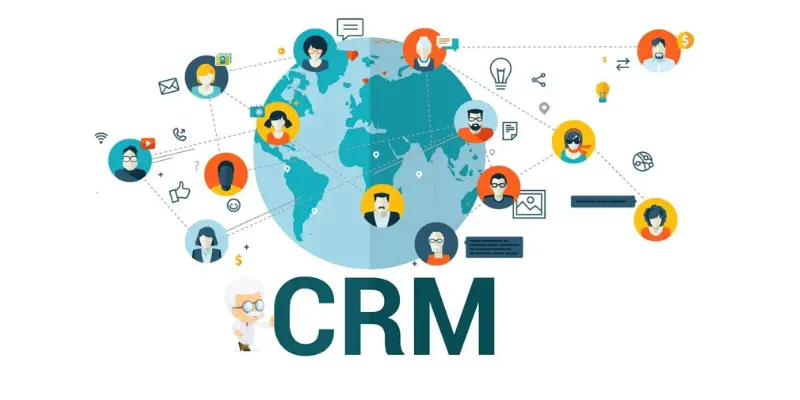Solar CRM – Your Complete Guide to Growing a Successful Solar Business
Updated: 28 Dec 2024
81

Introduction
Handling customers in the fast-growing solar industry can be challenging. Keeping track of leads, staying in touch, and managing projects can get messy. The fix? A Solar CRM ( Customer Relationship Management ) is a simple tool to keep everything organized and help your business grow.
Want to know how this tool can make your work easier? Let’s find out! 🚀
What is a Solar CRM?
A Solar CRM is a tool built specifically for solar businesses. It helps manage leads, track sales, and improve customer relationships. Instead of juggling spreadsheets, emails, and multiple tools, a Solar CRM keeps everything in one place, making your work easier and more organized.
Why Does Your Solar Business Need a CRM?
The solar industry is growing fast, and so is the competition. To stand out, you need tools that simplify your operations and improve efficiency. A Solar CRM can help you stay on top of leads, close more sales, and keep your customers happy all while saving you time.
Example: “Imagine having all your customer details, contracts, and project updates at your fingertips ready whenever you need them. That’s the power of a Solar CRM.”
- “Wondering how a Solar CRM can make your solar business more successful? Let’s dive in!” 🌞💡
Why is Solar CRM Important for Your Business?

Managing a solar business can get complicated. Solar CRM tools make it simpler by helping you organize, track, and optimize every step of your sales and customer management processes. Let’s look at the key ways Solar CRM benefits your business.
1. Streamlining Lead Management
Tracking leads manually can be frustrating and inefficient. A Solar CRM helps you manage, score, and prioritize leads effortlessly, ensuring you focus on the most promising ones.
- Example: A small solar company boosted its sales conversions by 40% after using a CRM to identify and prioritize high-potential leads.
2. Improving Customer Communication
Keeping customers in the loop is crucial for building trust. Solar CRMs automate follow-ups and send timely updates, ensuring your clients always know what’s happening.
3. Enhancing Project Management
From installation scheduling to post-installation services, Solar CRMs let you track project progress in real time. This ensures everything stays on schedule and your team operates smoothly.
4. Increasing Sales and Reducing Costs
Solar CRMs automate repetitive tasks like follow-up emails, saving your team time and reducing manual errors. This allows you to focus on closing more deals and growing your business.
- Tip: Use Solar CRM’s automation tools to send personalized emails to your leads. This not only saves time but also keeps your prospects engaged and more likely to convert.
With these benefits, Solar CRM can truly transform the way you manage your business! 🌟
Features to Look for in a Solar CRM to Transform Your Solar Business
Choosing the right Solar CRM means finding one that fits your business needs. Here are the must-have features to ensure your CRM helps you work smarter, not harder:
1. Lead and Customer Management Tools
Efficient lead and customer management are at the core of any good CRM. Look for tools that let you:
- Score leads based on their likelihood to convert.
- Create detailed customer profiles with essential information.
- Segment customers into groups for targeted marketing efforts.
2. Proposal and Contract Generation
A powerful Solar CRM should simplify creating project proposals and contracts by:
- Allowing quick generation of proposals with ROI and savings estimates.
- Ensuring contracts are organized and easy to share.
3. Integration Capabilities
The CRM should integrate seamlessly with the tools you already use. For example:
- Design software: Aurora Solar or Scoop Solar for creating accurate system designs.
- Accounting tools: For managing finances and invoices efficiently.
4. Mobile Access and Real-Time Updates
A mobile-friendly CRM ensures you can:
- Access customer details, schedules, and updates from anywhere.
- Keep your team informed with real-time data on the go.
5. Automation and APIs
Automation saves time and reduces errors. A good Solar CRM should automate tasks like:
- Sending follow-up emails.
- Scheduling reminders for contract renewals.
- Running targeted marketing campaigns.
6. Analytics and Reporting Tools
Solar CRM with analytics can give you insights into:
- Sales trends and what’s working.
- Lead conversion rates for improving strategy.
- Team performance metrics to track productivity.
Real-Life Scenario: “A solar installer analyzed their CRM data and found that marketing campaigns on social media generated the highest-quality leads. This insight helped them focus efforts on that platform and increase conversions.”
Having these features in your Solar CRM can significantly boost your business efficiency and give you the tools to scale effectively! 🌟
How to Choose the Best Solar CRM for Your Business
Selecting the right Solar CRM can feel overwhelming, but breaking it into simple steps can help you find the perfect fit. Here’s what to consider:
1. Assess Your Business Needs
Every business is different, so start by understanding what you need:
- For Small Businesses: Look for affordable options with user-friendly interfaces that don’t overwhelm your team.
- For Larger Firms: Opt for scalable CRMs with advanced features like automation, analytics, and multi-team support.
2. Consider Integration Options
Your CRM should work seamlessly with other tools you rely on, such as:
- Design Software: Like Aurora Solar or Scoop Solar for creating proposals and designs.
- Accounting Tools: For managing invoices and payments.
- Marketing Platforms: To automate campaigns and improve lead tracking.
3. Evaluate Pricing and Customer Support
Solar CRMs often come with tiered pricing plans. Look for:
- Free trials or demos to test how well the software meets your needs.
- A responsive customer support team to help with troubleshooting and onboarding.
4. User Experience (UX) Matters
A Solar CRM with an intuitive design makes it easier for your team to:
- Learn the system quickly without long training sessions.
- Navigate the dashboard and manage tasks efficiently.
“Start with a free trial or demo version of the CRM. Test its features and see if it aligns with your business processes before committing.”
The Strategic Benefits of Using a Solar CRM for Business Growth
Investing in a Solar CRM can transform how your business operates by simplifying processes and enhancing customer experiences.
1. Saves Time and Effort
Solar CRM automates repetitive tasks like follow-ups and data entry, freeing up your team to focus on closing deals and building relationships.
2. Enhances Customer Satisfaction
With clear communication and timely updates, Solar CRM ensures your customers feel informed and supported during every stage of their journey from inquiry to installation and beyond.
3. Drives Business Growth
By streamlining operations, Solar CRM boosts productivity and helps retain customers, setting the stage for steady growth in a competitive market.
A Solar CRM isn’t just a tool it’s a powerful asset to help your solar business thrive. 🌟
Examples of Popular Solar CRMs
1. Shape CRM is an all-in-one solution that excels in automation, lead scoring, and integration with design tools like Aurora Solar. It is ideal for businesses aiming to streamline lead and project management.
2. SPOTIO focuses on optimizing field sales operations with features like geo-tracking and route planning. It’s best suited for solar businesses with mobile sales teams.
3. Zoho CRM is a customizable and affordable option, offering tools for automation, lead segmentation, and analytics. It’s a great fit for small to mid-sized solar companies.
4. Salesforce Sales Cloud provides advanced tools for sales pipeline management and marketing integration, making it ideal for large-scale solar businesses.
- Pro Tip: Compare features, pricing, and customer support options, and try a free demo to determine the best CRM for your needs.
Conclusion
A Solar CRM is a game changer for solar businesses, simplifying lead management, improving customer communication, and streamlining project tracking. It boosts sales, saves time, and helps you focus on growing your business and satisfying customers. Investing in the right CRM ensures long-term success, whether you’re a small startup or an established player.
Ready to transform your solar business? Don’t stop here check out our Complete Solar Marketing Guide to discover strategies that can boost your business to the next level!
What does CRM mean in solar?
CRM in solar stands for Customer Relationship Management. It helps businesses manage leads, sales, and customer interactions in an organized way, making it easier to grow.
What is CRM in solar?
A Solar CRM is a tool designed to streamline solar business operations. It automates lead management, customer communication, project proposals, and contracts, making your business more efficient.
What is the main purpose of Solar CRM?
The purpose of Solar CRM is to manage leads, simplify sales processes, and improve customer relationships. It keeps everything organized in one system.
How much does a Solar CRM typically cost?
Prices for Solar CRM range from $25 to $300 per month, depending on the features. Many providers also offer free trials so you can test them before buying.
Which design software works best with Solar CRM?
Solar CRMs integrate with popular tools like Aurora Solar, Scoop Solar, and SolarPlus, allowing you to create accurate designs and detailed proposals seamlessly.
Is Solar CRM suitable for small businesses?
Yes! Many Solar CRMs are budget-friendly and simple to use, making them ideal for small businesses that want to streamline their operations and grow.
Which CRM tool is the best?
The best CRM tool depends on your needs. Popular options include Zoho CRM for affordability, Salesforce for scalability, and Insightly for combining project management with CRM.
What is CRM in energy?
In energy, CRM usually refers to Customer Relationship Management software that helps companies manage customer interactions, sales, and services. It can also mean a Capacity Remuneration Mechanism, ensuring electricity supply meets demand.
Who is the biggest CRM provider?
Salesforce is the largest CRM provider worldwide, offering cloud-based solutions for businesses of all sizes. Other top providers include Zoho CRM, Microsoft Dynamics, and SAP CRM.
Which country is No. 1 in solar energy?
China is the leading solar energy producer globally, followed by the United States, Japan, and Germany. These countries have heavily invested in renewable energy infrastructure.
Is SAP a CRM?
Yes, SAP provides CRM solutions designed for marketing, sales, and service management. It’s widely used by mid-size and large organizations for its powerful integration capabilities.
Please Write Your Comments